Recent Articles
Popular Makes
Body Types
2021 Hyundai Elantra HEV vs. 2021 Toyota Corolla Hybrid
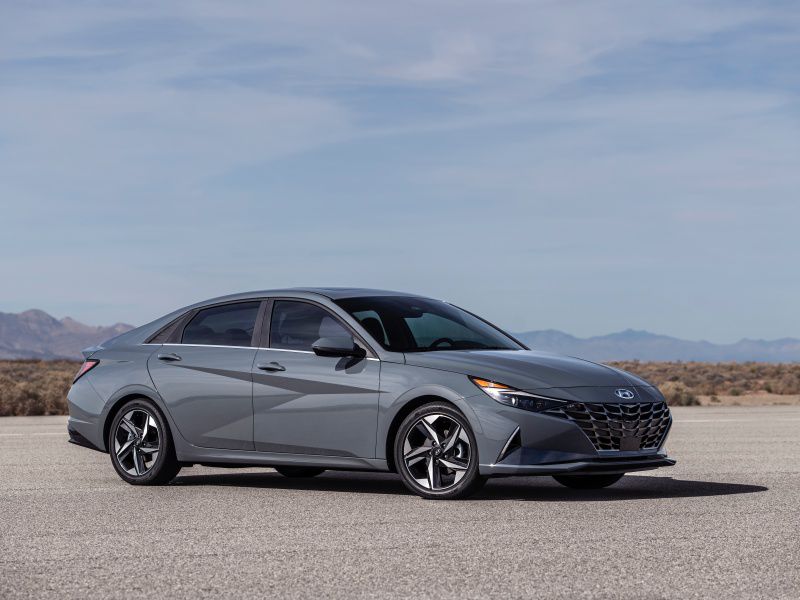
2021 Hyundai Elantra Hybrid ・ Photo by Hyundai
The Hyundai Elantra HEV is the latest challenger in the hybrid compact segment, while the Toyota Corolla Hybrid waded into that pool for the first time in 2020. But of course, Toyota has long been known for its hybrids led by one of the granddaddies of the genre, the Toyota Prius. The Toyota Corolla is one of the best-selling cars of all time; it's a popular favorite in the American market. The Hyundai Elantra has been a strong seller for decades as well. The big news for 2021 is an all-new Elantra generation, which includes a hybrid model for the first time, the Hyundai Elantra HEV. Both the Corolla Hybrid and the Elantra HEV offer 4-cylinder powertrains complemented by electric motors and battery packs. Both vehicles seat five comfortably. In terms of versatility, safety, interior room, and overall economy, they both are worthy of very strong praise.
Exterior Design
Hyundai designers went bold with the 2021 Elantra. The sedan is one of the most highly styled vehicles in the segment. In its seventh generation, the Elantra has adopted the ”four-door coupe” look that has become popular around the globe. This includes a roofline that slants from front to rear, giving the vehicle a feeling of kinetic motion. Compared to the previous version, the 2021 Elantra is longer and wider with its cowl moved back two inches to add to the performance feel. In comparison, the Corolla Hybrid’s exterior design is more mainstream. It's a handsome sedan, and some will prefer its simplicity versus the added folds and creases of the Elantra HEV. The Corolla rolls on 15-inch alloy wheels with low-rolling-resistance tires. The Elantra HEV has 16-inch alloy wheels as standard equipment. : Hyundai Elantra HEV
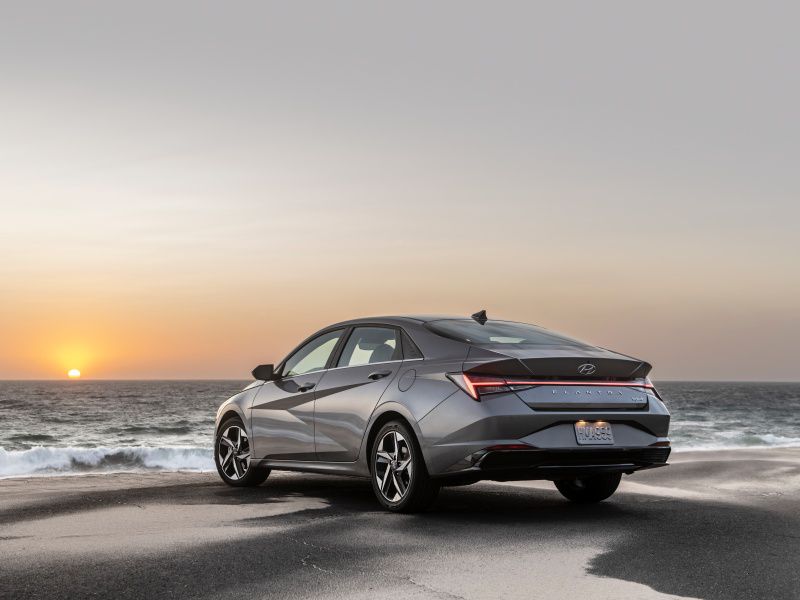
Photo by Hyundai
Engines & Transmissions
The 2021 Hyundai Elantra HEV uses a hybrid system that is similar to that of the 2021 Toyota Corolla Hybrid. However, there are a few important differences. It pairs a 1.6-liter direct-injection Atkinson-cycle 4-cylinder engine with a permanent-magnet electric motor. Its lithium-ion-polymer battery has 1.32 kWh of capacity, and it is positioned under the rear seats. In total, the hybrid system produces 139 horsepower and up to 195 lb-ft of torque. The Corolla Hybrid uses a 1.8-liter four-cylinder gasoline engine teamed with two motor generators through an electronically controlled planetary-type continuously variable transmission transaxle. The two motors are powered by a nickel-metal hydride (Ni-MH) battery pack that is snuggled under the rear seats. The combined system output is 121 horsepower. In contrast to the planetary-gear CVT used in the Corolla, the Elantra HEV uses a 6-speed, dual-clutch transmission. : Hyundai Elantra HEV
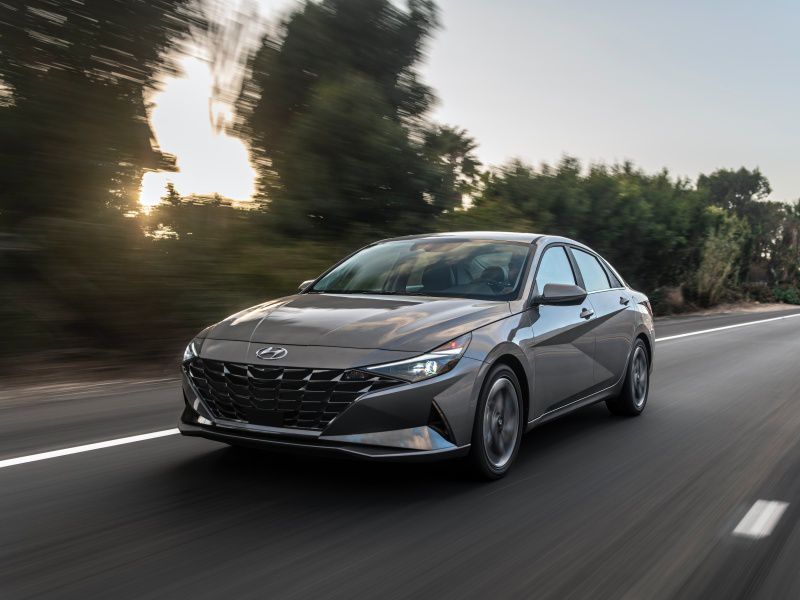
Photo by Hyundai
Safety & Driver Aids
Toyota was one of the pioneers in equipping lower-priced vehicles with an array of electronic safety and driver-assist technology. The 2021 Corolla Hybrid offers Toyota Safety Sense 2.0, a comprehensive array that includes an automatic-braking pre-collision system, full-speed adaptive cruise control with auto-stop, lane departure warning with steering assist, and lane tracing/lane centering assist. It also features automatic high-beam headlight control and road sign recognition and assist. The 2021 Hyundai Elantra HEV counters with a variety of safety and security features in its SmartSense package. Standard features include forward collision-avoidance assist with pedestrian detection, lane-keeping assist, lane-following assist, and driver attention warning. High-beam headlight control, blind-spot collision avoidance assist, rear cross-traffic collision-avoidance assist, and safe exit warning are additional standard safety features. Adaptive cruise control, standard on the Corolla, is optional on the Elantra HEV. : Hyundai Elantra HEV
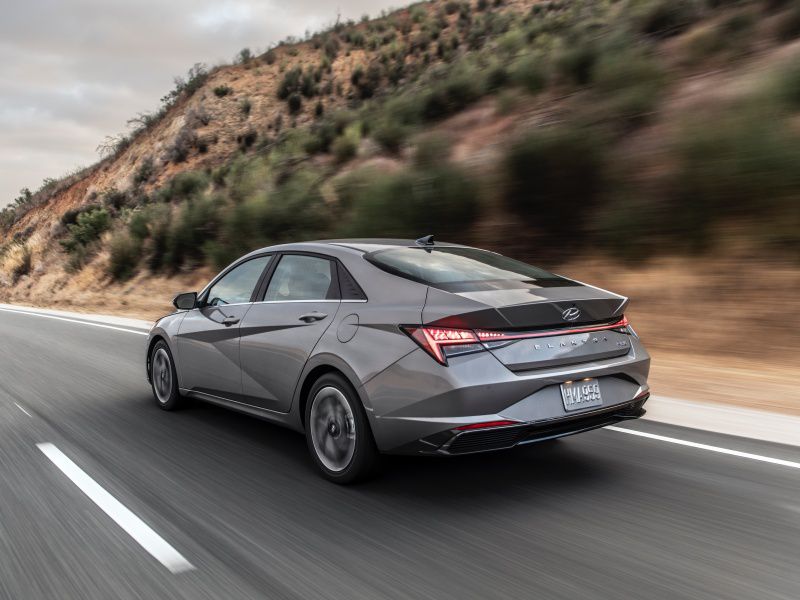
Photo by Hyundai
Handling & Roadability
The Hyundai Elantra HEV and Toyota Corolla Hybrid offer similar driving dynamics. They take good advantage of their relatively modest horsepower ratings, and they leverage the electric-motor torque that their hybrid systems offer them. The Elantra HEV has the benefit of a dual-clutch transmission, but you won’t confuse it with a sports sedan. Acceleration is leisurely. While the multi-link rear suspension delivers better handling than the conventional-powered Elantra that lacks it, comfort, not performance, is the watchword. Steering is mild-mannered. The Corolla Hybrid offers even fewer total horsepower than the Elantra HEV, but in everyday driving, the two cars feel very similar. Like the Elantra HEV, the Corolla Hybrid has a multi-link rear suspension and makes good use of electrified power. In both cars, the regenerative brakes that supply electricity to the battery pack aren’t nearly as obtrusive as they are in some hybrid vehicles. : Tie
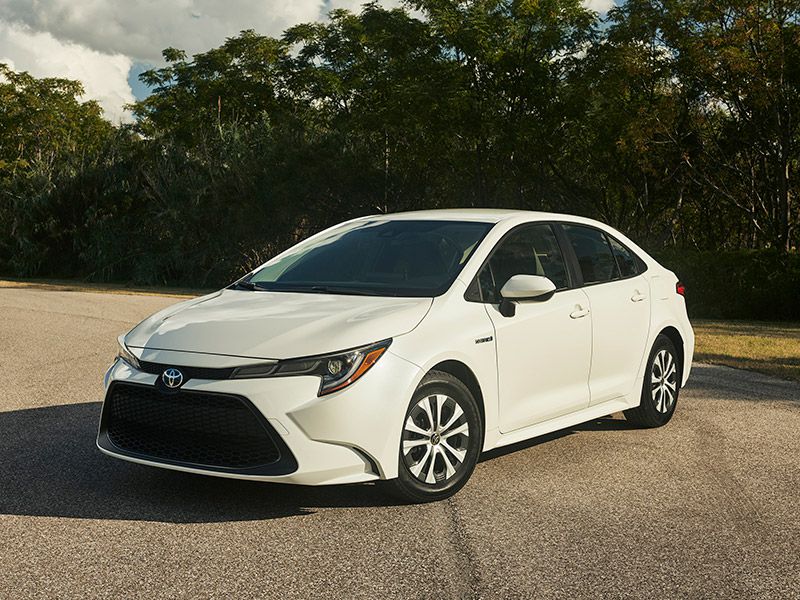
Photo by Toyota
Exterior Dimensions
The tale of the tape tells a lot about the merits of these two vehicles. The Elantra HEV is almost 2.0-inches longer than the Corolla Hybrid, and it is almost an inch shorter in overall height than its rival. That means the Elantra HEV offers a coupe-like profile, while the taller Corolla Hybrid has a standard sedan look. Do you like highly expressive styling with lots of sculpting and character lines? Or do you prefer a calmer, more tailored approach? If you said the latter, odds are you will like the exterior styling of the Toyota Corolla Hybrid. It is good-looking yet restrained, and we have a feeling the design will wear well. Its front end tells you it's a Toyota, but the rest of the car could wear any badge. If you’d rather have a car that sports leading-edge styling, you will probably favor the somewhat larger Hyundai Elantra HEV. Its body sides are heavily sculpted, and it has a pronounced fastback roofline. : Tie
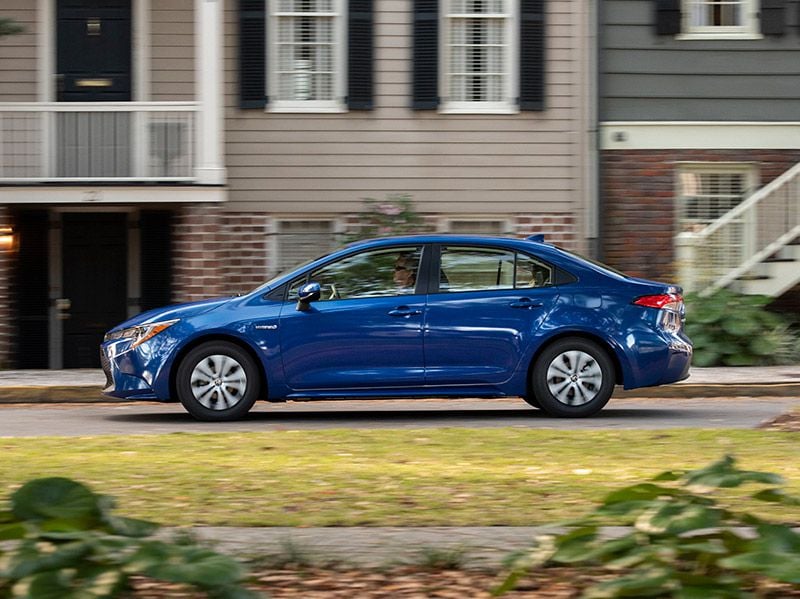
Photo by Toyota
Interior Style
Both the Hyundai Elantra HEV and the Toyota Corolla Hybrid offer their buyers attractive interiors filled with easy-to-use features. We’re surprised at the amount of hard plastic in the Hyundai Elantra HEV’s interior, but on the other hand, the upscale Limited trim level offers two standard 10.25-inch display screens, one for the infotainment system and one for the driver information center. They alone set the Elantra HEV apart from other vehicles in its segment. The entry-level Blue version has more equipment than an entry-level conventional Elantra, and the Limited ups the ante with luxuries like leather seats. The Corolla features a 6-way adjustable driver’s seat, 4-way adjustable front passenger seat, and 60/40 split fold-down rear seat. It also offers a conventional instrument cluster with some dedicated gauges plus a 7-inch color TFT display that includes hybrid system information. Both vehicles seat four adults comfortably and five adults in a pinch. : Hyundai Elantra HEV
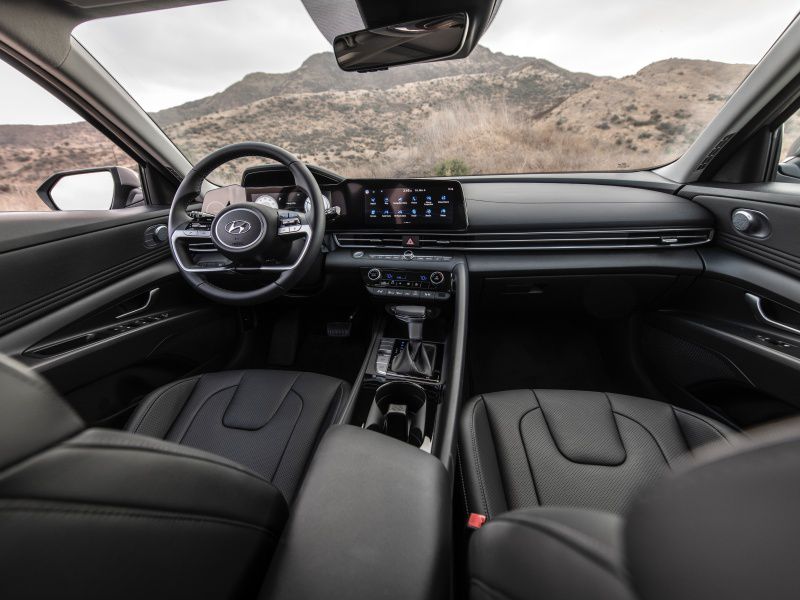
Photo by Hyundai
Infotainment & Tech
Hyundais have had a long history of easy-to-understand infotainment systems. Toyota has struggled in this area in the past and has suffered from the lack of Apple CarPlay and Android Auto, but most of those issues are behind Toyota now. The Corolla’s Entune 3.0 audio system includes an 8-inch touchscreen, six speakers, Apple CarPlay compatibility, and Amazon Alexa. As good as the Toyota’s system is, though, the Elantra HEV’s is better. The base display is an 8-inch touchscreen and the Limited trim models have a 10.25-inch screen. The Elantra HEV Blue trim has wireless Apple CarPlay and wireless Android Auto, while the uplevel Limited has wired versions of those systems plus an integrated navigation system. Another Elantra plus is its “natural language” voice recognition system. The Elantra HEV Limited also has Qi wireless device charging and a Bose sound system with eight speakers. : Hyundai Elantra HEV
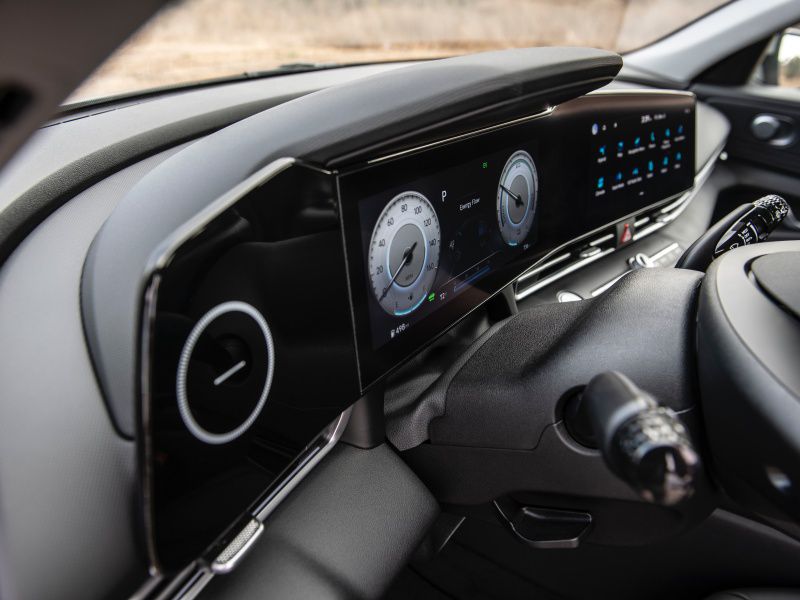
Photo by Hyundai
By the Numbers
When it comes to fuel economy, the Hyundai Elantra HEV and the Toyota Corolla Hybrid possess great efficiency. The fuel-saving Elantra Blue trim has EPA ratings of 53 mpg in the city, 56 mpg on the highway, and 54 mpg combined. The Limited trim with larger tires and added equipment; it's EPA-rated at 49 mpg city/52 mpg highway/50 mpg combined. The Toyota Corolla Hybrid has EPA ratings of 53 mpg city/52 mpg highway/52 mpg combined. In comparison, the conventionally powered 2021 Hyundai Elantra has EPA fuel economy ratings of 33 mpg city/43 mpg highway/37 mpg combined, while the conventional 2021 Toyota Corolla offers 31 mpg city/40 mpg highway/34 mpg combined, depending on the model and equipment. With fuel economy of 50 mpg or better, both the 2021 Hyundai Elantra HEV and the 2021 Toyota Corolla Hybrid are among the most fuel-efficient new vehicles available. : Tie
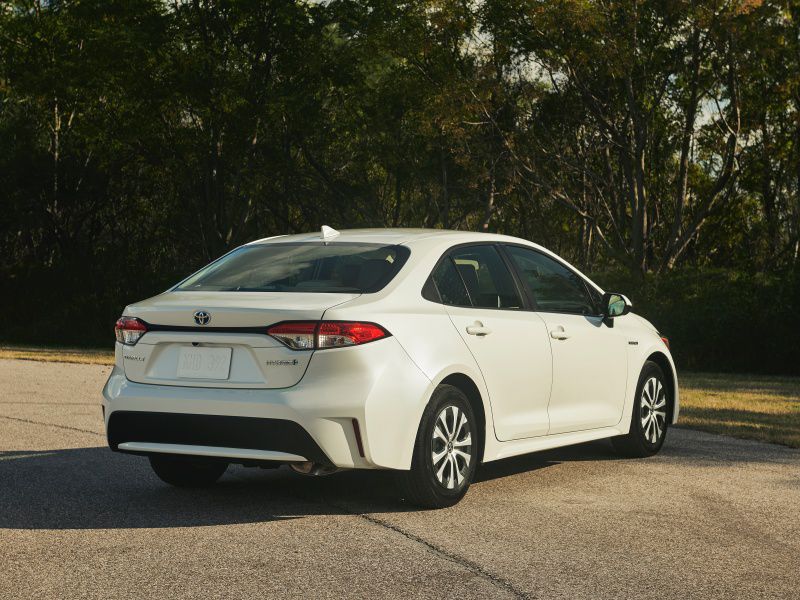
Photo by Toyota
The Verdict
While the all-new Hyundai Elantra HEV shades the 2021 Toyota Corolla Hybrid in several categories and the two vehicles tie in others, it is actually difficult to pick a winner here because the two vehicles are so similar and so good. Price is certainly no differentiator because just $50 separates the base Hyundai Elantra HEV ($23,550) from the Toyota Corolla Hybrid ($23,600.) If you’re seeking a more highly equipped vehicle, though, the choice is clear — the Hyundai Elantra HEV Limited trim with a base price of $28,100. In virtually every category — comfort, convenience, driving dynamics, and fuel economy — the two hybrid sedans have very similar attributes. Both offer high-quality construction, easy-to-understand controls, and a generous level of standard safety equipment. The Hyundai Elantra HEV does offer a much longer vehicle warranty, and that’s why, in this very close comparison, we choose the Hyundai Elantra HEV. : Hyundai Elantra HEV
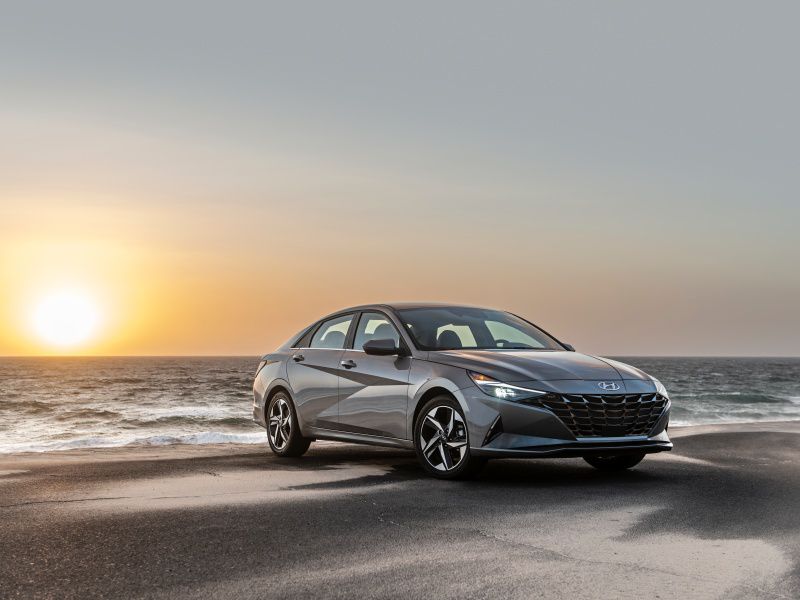
Photo by Hyundai